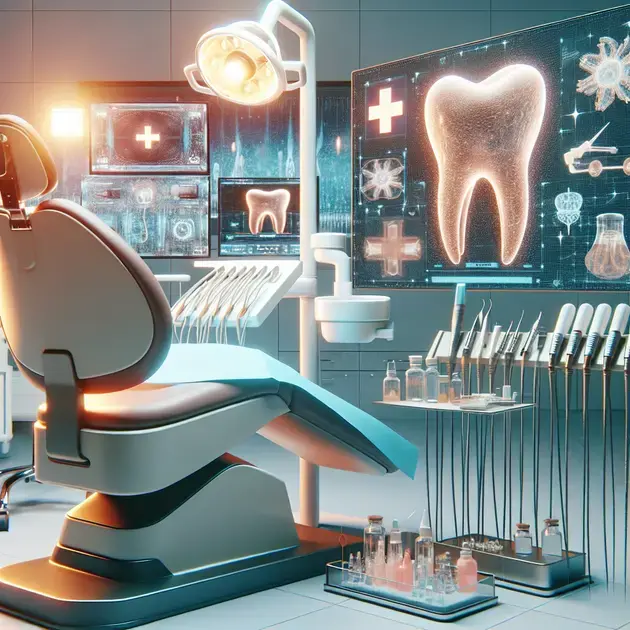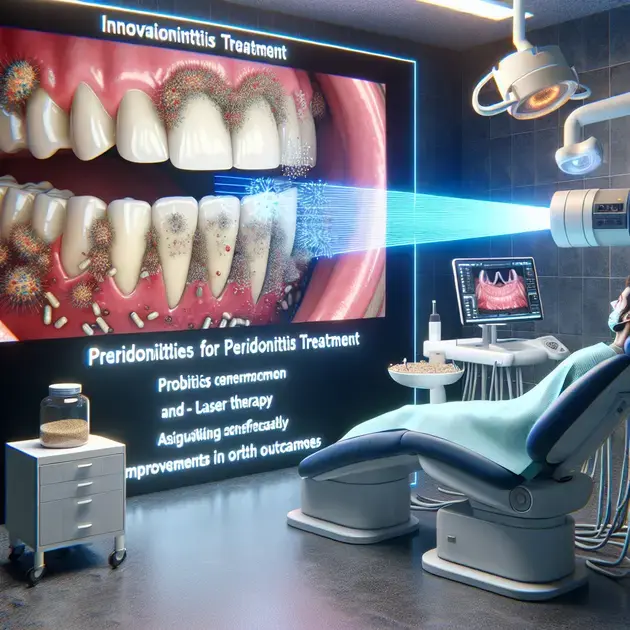When it comes to treating periodontitis, having access to effective medication is crucial for managing this common oral health condition. In this comprehensive guide, we will explore the various options available and provide valuable insights into the best practices for combating periodontitis.
Recent studies have shown that a combination of antibiotics and deep cleaning procedures can significantly improve the outcome for patients with periodontitis. By understanding the importance of proper medication and treatment methods, individuals can take proactive steps towards achieving better oral health and preventing the progression of this condition.

Understanding Effective Medication for Periodontitis
When it comes to treating periodontitis, understanding the effective medication options available is crucial. One of the common medications prescribed for periodontitis is antibiotics. These medications can help to eliminate the bacteria causing the infection and reduce inflammation in the gums.
If you are looking for information on specific antibiotics used for periodontitis treatment, you can consult reputable medical websites such as WebMD or the American Academy of Periodontology. They provide detailed explanations of the different types of antibiotics, their dosages, and potential side effects.
It is important to consult with your dentist or periodontist before starting any medication for periodontitis. They will be able to assess your condition and recommend the most suitable treatment plan for you.
Additionally, staying consistent with your medication regimen is key to effectively managing periodontitis. Make sure to follow your healthcare provider’s instructions carefully and complete the full course of antibiotics as prescribed.
By understanding the importance of effective medication for periodontitis and following the prescribed treatment plan, you can improve your oral health and prevent further complications.
The Significance of Antibiotics in Treating Periodontitis
Antibiotics play a significant role in treating periodontitis by targeting and eliminating the harmful bacteria that cause the infection. They can be prescribed in various forms, including pills, mouth rinses, or gels, depending on the severity of the condition.
One of the key benefits of using antibiotics for periodontitis is their ability to reach deep into the gum pockets where bacteria thrive. This can help to reduce inflammation, promote healing, and prevent the progression of the disease.
For detailed information on the significance of antibiotics in treating periodontitis, you can refer to scientific journals such as the Journal of Periodontology or professional dental websites like the American Academy of Periodontology.
It is important to note that antibiotics should be used as part of a comprehensive treatment plan that includes professional cleanings, good oral hygiene practices, and regular dental check-ups. Consult your dentist to determine the most appropriate antibiotic therapy for your specific condition.
By recognizing the significance of antibiotics in treating periodontitis and incorporating them into your treatment regimen, you can effectively combat the infection and safeguard your oral health.
Proactive Steps for Implementing Best Practices
Implementing best practices for managing periodontitis requires a proactive approach to oral health care. One of the first steps is to establish a solid oral hygiene routine that includes brushing twice a day, flossing regularly, and using an antiseptic mouthwash.
You can track your oral hygiene habits and set reminders for your dental appointments using apps like Dental Monitor or My Dental App. These apps offer features such as interactive brushing timers, personalized oral care tips, and appointment scheduling to help you stay on top of your dental health.
Another proactive step is to maintain a healthy diet rich in fruits, vegetables, and calcium to support gum health and overall oral well-being. Drinking plenty of water and limiting sugary snacks can also help prevent plaque buildup and reduce the risk of gum disease.
In addition to personal oral care practices, regular visits to your dentist or periodontist are essential for monitoring your oral health status and addressing any potential issues promptly. Schedule check-ups at least twice a year to ensure early detection and timely treatment of periodontitis.
By taking proactive steps to implement best practices for periodontitis management, you can protect your gums, preserve your teeth, and enjoy a healthy smile for years to come.

**The Role of Probiotic Supplements in Periodontitis Management**
Probiotic supplements have gained attention in the field of periodontitis management due to their potential beneficial effects on oral health. Studies have shown that certain strains of probiotics can help restore the balance of good bacteria in the oral microbiome, leading to a reduction in inflammation and improved gum health. By incorporating probiotic supplements into a comprehensive periodontal treatment plan, patients may experience enhanced results and better long-term oral health outcomes.
One particular study investigated the use of probiotic supplements in conjunction with traditional periodontal therapy for patients with chronic periodontitis. The results showed that the group receiving probiotics in addition to scaling and root planing had significantly lower levels of inflammation and a decrease in pocket depths compared to the group receiving only conventional treatment. This suggests that probiotic supplements may play a valuable role in enhancing the effectiveness of standard periodontal interventions.
Furthermore, probiotics have been shown to have antimicrobial properties, capable of inhibiting the growth of harmful bacteria in the oral cavity. By crowding out pathogenic species and promoting the growth of beneficial bacteria, probiotic supplements can help maintain a healthy balance in the oral microbiome, which is essential for preventing and managing periodontal disease. This natural approach to oral care offers a promising alternative or complement to traditional antibiotic therapies, especially for individuals seeking a more holistic and sustainable treatment option.
In conclusion, the role of probiotic supplements in periodontitis management is an exciting area of research with promising results. By supporting a healthy oral microbiome, reducing inflammation, and promoting gum health, probiotics have the potential to revolutionize the way we approach periodontal treatment. Incorporating probiotic supplements into a comprehensive oral care routine may lead to improved outcomes for patients with periodontitis and contribute to overall better oral health.
**Innovative Approaches to Periodontitis Treatment Beyond Medication**
Traditional medication plays a significant role in the treatment of periodontitis, but innovative approaches beyond pharmaceuticals are emerging as valuable additions to the current treatment modalities. One such approach is the use of photodynamic therapy (PDT), a non-invasive technique that harnesses the power of light and photosensitizing agents to target and eliminate periodontal pathogens. By selectively destroying bacteria while preserving healthy tissues, PDT offers a promising alternative to traditional antibiotic therapy and surgical interventions.
Another innovative approach to periodontitis treatment is the use of laser therapy, which utilizes laser light to remove inflamed gum tissue and bacteria from periodontal pockets. This minimally invasive technique promotes tissue regeneration and reduces the need for surgical intervention, leading to faster healing and improved outcomes for patients. By incorporating laser therapy into periodontal treatment plans, clinicians can offer a more comfortable and effective alternative to traditional scaling and root planing procedures.
Additionally, regenerative therapies such as platelet-rich plasma (PRP) and growth factors are revolutionizing the field of periodontal treatment by promoting tissue repair and regeneration. By harnessing the body’s own healing mechanisms, these innovative approaches accelerate the healing process, reduce inflammation, and enhance overall treatment outcomes. PRP has been shown to enhance bone formation and tissue regeneration in periodontal defects, offering a promising solution for patients with advanced periodontitis or compromised healing abilities.
In conclusion, innovative approaches to periodontitis treatment beyond medication are reshaping the landscape of periodontal care. By embracing non-invasive techniques such as PDT and laser therapy, as well as regenerative therapies like PRP, clinicians can offer patients more effective, comfortable, and sustainable treatment options. These advancements in periodontal care not only improve outcomes for patients but also pave the way for a more holistic and patient-centered approach to managing periodontitis.
**The Impact of Lifestyle Changes on Periodontitis Progression and Treatment**
Lifestyle plays a crucial role in the progression and treatment of periodontitis, with factors such as diet, tobacco use, and stress having a significant impact on oral health. Research has shown that individuals who consume a diet high in sugars and processed foods are at a higher risk of developing periodontal disease due to the inflammatory response triggered by these dietary patterns. On the other hand, a diet rich in fruits, vegetables, and whole grains provides essential nutrients and antioxidants that support gum health and overall oral well-being.
Tobacco use is another major lifestyle factor that contributes to the progression of periodontitis. Smoking not only weakens the immune system’s ability to fight infections but also impairs blood flow to the gums, making it harder for the body to repair damaged tissues. Smokers are more likely to experience severe periodontal disease and have a reduced response to treatment compared to non-smokers. By quitting smoking and avoiding tobacco products, individuals can significantly improve their periodontal health and enhance the outcomes of treatment interventions.
Moreover, stress has been identified as a potential risk factor for periodontal disease, as chronic stress can weaken the immune system and increase inflammation throughout the body, including the gums. High levels of stress have been associated with a higher prevalence of periodontitis and poorer treatment outcomes, highlighting the importance of stress management strategies in comprehensive periodontal care. Techniques such as mindfulness, meditation, and regular exercise can help reduce stress levels, improve immune function, and support overall oral health.
In conclusion, the impact of lifestyle changes on periodontitis progression and treatment is undeniable, with diet, tobacco use, and stress playing key roles in the development and management of this common oral health condition. By adopting a healthy diet, avoiding tobacco products, and managing stress effectively, individuals can positively influence their periodontal health and enhance the effectiveness of treatment interventions. Educating patients on the importance of lifestyle modifications and supporting them in making healthy choices can lead to better long-term outcomes and improved oral well-being.
Conclusion
In conclusion, the role of probiotic supplements in periodontitis management presents a promising avenue for improving oral health outcomes. By restoring the balance of good bacteria in the oral microbiome, probiotics have demonstrated efficacy in reducing inflammation and enhancing gum health. Incorporating probiotic supplements into comprehensive periodontal treatment plans can potentially revolutionize traditional approaches, leading to better long-term results for patients.
Furthermore, innovative approaches to periodontitis treatment beyond medication, such as photodynamic therapy (PDT) and laser therapy, offer non-invasive and effective alternatives to conventional pharmaceutical interventions. These techniques target periodontal pathogens while promoting tissue regeneration, ultimately improving treatment outcomes and patient comfort. Additionally, regenerative therapies like platelet-rich plasma (PRP) hold significant promise in enhancing tissue repair and regeneration, particularly in cases of advanced periodontitis.
The impact of lifestyle changes on periodontitis progression and treatment cannot be overstated. Factors such as diet, tobacco use, and stress play crucial roles in the development and management of periodontal disease. By adopting a diet rich in nutrients, quitting smoking, and implementing stress management strategies, individuals can positively influence their oral health and treatment outcomes. Educating patients on the importance of lifestyle modifications is key to achieving better long-term oral well-being.



